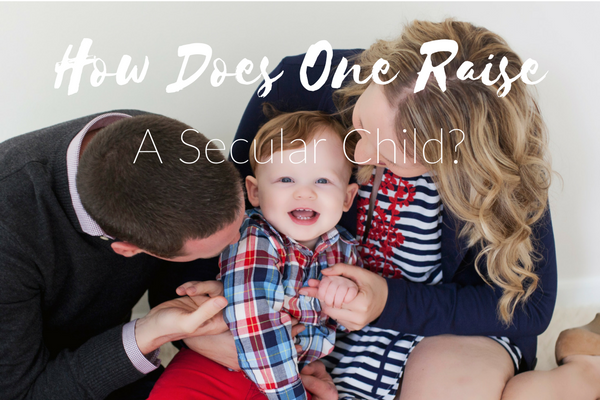
When my wife and I started discussing whether or not to have kids, the issue of religion came up over and over again. Neither of us are religious, but both our families are devoutly Catholic. Having grown up in that environment, neither of us knew how to raise a child without the guidance of an organized religion. We also weren’t aware of anyone else in our circle of friends who were actively raising their children without religion. The question then became, if we had kids, how would we raise them to be open-minded, ethical people with a good moral compass without religion? We knew it was possible, but we weren’t sure of the best way to proceed. It felt pretty overwhelming. So much so that we were hesitant to even start a family. Ultimately, we decided it was silly to let fear of the unknown prevent us from having kids and so we started our family.
Where Do We Begin?
During our search we found two books, Parenting Beyond Belief and Raising Freethinkers, which helped to provide a framework for how we plan to raise our son to become a morally sound individual.
Parenting Beyond Belief is a book which consists of several essays from numerous authors. The intent of the book is to help the reader think through many of the topics that are typically the domain of traditional religion. Some of things written about in the book are:
- Why should we be good if we don’t believe in God? / What ethical principles should you live by if you don’t believe in God?
- What is the purpose of our lives if we don’t believe in God?
- What happens when we die? What do we tell others when they ask us this question?
- As well as the more minor questions like, what should we say/do about Santa and the Easter Bunny?
The book prompted me to explore in further detail answers to questions I had only thought about in passing.
The second book, Raising Freethinkers, is meant to help supplement the previous book by acting as a resource / guide. All of the chapters have a questions and answers section to commonly asked questions. There are activities that can be done with various age groups to help instill various ethical principles, as well as ways to promote a curious mind. The book also has a list of further resources should the reader want to dig deeper into a particular topic.
Creating Our Own Family Values
After finishing the books, my wife and I decided that we plan on raising our son with the following set of values.
The Golden Rule is golden. Some iteration of this rule exists in all religions / cultures and is as good of a universal “rule” as you’re going to find. We feel that if you follow this rule you’ll have a pretty good foundation upon which you can build the rest of your virtues.
In addition to The Golden Rule, we found 8 secular virtues, referenced in Parenting Beyond Belief, that we wanted to instill in our son.
- The first virtue, and most important in my opinion, is humility. Our desire is that our son will demonstrate humility by caring as much about how other people think and feel as he cares for himself. He should spend more time asking about other people’s interests and opinions than he spends talking about himself. And when he encounters a situation where he disagrees with someone else, we hope that he will still able to find something to validate in the other person’s thoughts / argument. Now, that’s not to say we want him to be a follower and not have any convictions of his own. On the contrary, we want him to be passionate about what he believes in, but we also want him to always be open to that fact someone else may have found a greater truth than what he currently understands. The phrase “I could be wrong about this/that” should be part of his vocabulary when discussing any of his opinions. Hopefully, if we do this right, we will be able to model this kind of humility on a daily basis so that he sees it in action rather than through hypocrisy.
- Empathy is also a virtue we hope to model for our son. We want him to have the ability to try and understand how people feel so that he doesn’t merely feel “sorry for people”, but rather tries to understand how and why they feel the way they do. We hope to try and find opportunities for him to engage with people from different races / cultures / religions so that he doesn’t merely see a homogenous culture and is pushed to see things from different perspectives in life. Similarly, we feel it is important that our son be educated in all world religions so that he can better understand the world in which he lives. We feel this may also help him to understand and recognize why people would want to believe in religion, and hopefully, discourage the desire to feel superior, mock, or roll his eyes at people who have beliefs that differ from his own.
- Courage is important because it often takes a lot of courage to be different. There will undoubtedly be times when it will be difficult to be a person without belief in God. I’m sure there will be some who will make fun of him, or tell him he is going to hell, but I hope that he will have the courage to stand up for himself, and use reason and his intellect to explain why he believes what he believes. And if, at a later point in time when he is old enough to make up his mind about what he believes, he decides that he wants to believe in a higher power, I hope he has the courage to tell us so.
- Going hand-in-hand with courage is honesty. We plan on teaching our son to be honest in everything he does, even when it is difficult or inconvenient to do so. This is especially true when it comes to our beliefs. I know I still struggle with being fully honest when it comes to this part of my life. When someone asks me what I believe in, or what my religion is, I often hesitate, afraid of what the other person will think when I tell them that I am a humanist. I hope to be able to impart the courage and honesty necessary for my son to proudly state his beliefs when asked.
- Similar to humility is the virtue of openness. We hope to teach our son that no matter how certain we are of something, we could always still be wrong. If he is presented with facts that invalidate one of his currently held beliefs, I would hope he would be open enough that he would incorporate this new understanding into his worldview. One of the ways we hope to accomplish this is to teach him that there is usually more than one way to do something and that we should embrace the differences that exist in our society because this is what makes life unique and beautiful.
- Second only to the humility in my opinion, is generosity. If this life is all we have, then we need to make sure we make the most of our time here in order to make this world a better place. No one, or thing, will do it without us. We hope to instill this in our son by regularly performing acts of charity within the community. We also want to instill that more should be done than just volunteering at a soup kitchen every once in awhile. That’s great, but being generous is more than this. We want him to be generous with his compliments for others, to be generous with his time when someone is in need of a friend, etc. Ultimately, the goal is to try and improve the overall quality of life of those around him with his daily choice of activities.
- Gratitude. We want him to be grateful for all he has been given in his life. We hope to instill this by regularly saying grace for the things we have, for the people who have made / grown our food, for the people who have supported us emotionally / financially / physically, for our health and for all the other things in our lives for which we are thankful.
- Finally, we hope to instill the virtue of respect. In my opinion one of the easiest ways to model this is in how we discipline him. My answer should never be “Because I said so!” to the dreaded “Why should I do that?” That’s a bogus answer, and in my opinion, is a sure fire way to lose the respect of your child. Kids can see through hypocrisy and unjustness from a mile away. But if you show your child respect by giving them well thought out answers to their questions they will eventually come around and respect you more for it in the end.
Putting It All Together
One of the things that became evident during our search was how similar our plan turned out compared to the religious values our parents had instilled in us. I guess too often, we as a society, spend so much time focusing on our differences that we fail to see our similarities. And while it will be hard to perfectly model these values, I feel pretty good knowing that we have a good plan to help us along this path. With any luck our son will turn out to be an open-minded, ethical person with a good moral compass.













This article is beautifully written and perfectly captures the essence of secular parenting. Well done! As I started my journey away from religion, I also struggled with how few resources were available to me about raising kids without religion. I had no idea where to start and I felt like my husband and I were the only parents out there attempting this. Parenting Beyond Belief was incredibly helpful. I feel like sorting through such thought-provoking philosophical questions has made me not just a better parent, but a better person. It has required a great deal of research, effort, time, and soul-searching to parent against the status-quo, but it has ultimately been a journey that has helped our family forge a strong identity together. Thank you for representing secular families so well and for reminding the rest of us that we are not alone.
Thank you for writing this piece. It will be a great touchstone as we look for ways to instill moral values in our daughter without religion.
Your son is lucky to have such thoughtful, loving parents. You may well instill in him each and every one of the values you have listed here. People who participate in organized religion are not necessarily better people than those who do not, or at least not all the time. Life is full of ups and downs, and we may surprise ourselves and others to discover that at various points along the way we are capable of great goodness and great evil, or if not “great evil,” then at least being capable of doing stuff we are not too proud of. What your son might miss during those difficult times is a sacramental life that includes the healing grace of reconciliation. Religion is not for perfect people and participating in it is no guarantee of living a perfectly moral life. During challenging times in his life, your son might miss having a community of other people praying with him and for him. I general, I think his life will be more difficult without prayer, without scared music, sacred spaces, sacred art, and frankly, without Jesus and without God. The gift of faith is an extraordinary gift to give a child. Not every child raised in a religious household is really given enough catechism and formation to develop a mature faith as an adult. Those who are given this opportunity are often profoundly grateful to their parents, pastors, priests, and other teachers when they reach adulthood. This is not to say that religious people do not have doubts, crisis of faith, and grave disappointments in religious organizations that fail to deliver. They do. And during these times it is even more important for a person to be open to God’s grace working in their lives, even in the suffering and during times of doubt and pain and disappointment. Consider reading “Something other than God” by Jennifer Fulwiler, for a wonderful account of a child who was raised an atheist and found God as an adult. This book might be thought provoking for parents raising their children to be humanists, free thinkers, atheists, etc. She was raised in just such a family. This is just as much of a choice as choosing to raise a child in a particular faith. Ms. Fulwiler writes a very compelling and provoking memoir, that, to paraphrase one of my other favorite authors, ” shows us that while we are seeking God, he is seeking us even more.”